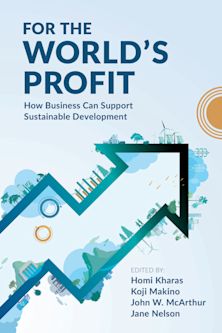- Home
- ACADEMIC
- Business & Management
- Corporate & Business Strategy
- The Commercial Society
This product is usually dispatched within 3 days
- Delivery and returns info
-
Free US delivery on orders $35 or over
You must sign in to add this item to your wishlist. Please sign in or create an account
Description
Once relatively confined to parts of Europe and North America, commercial societies are now found in many other cultures and continents. Yet despite the international spread and growth of commercial order, the moral, economic, and legal foundations of commercial society remain poorly understood, especially in those countries where it first took root. Guided by the thoughts of Alexis de Tocqueville, Samuel Gregg's The Commercial Society identifies and explores the key foundational elements that must exist within a society for commercial order to take root and flourish. Gregg studies the challenges that have consistently impeded and occasionally undermined commercial order, including the persistence of "corporatist" values and political movements seeking to equalize social conditions. This book offers a historically-grounded analysis for modern audiences interested in philosophy or the history of economics.
Table of Contents
Part 2 Part 1: Foundations
Chapter 3 Neither Angel nor Beast
Chapter 4 The System of Natural Liberty
Chapter 5 The Liberty of Law
Part 6 Part 2: Challenges
Chapter 7 The Temptation of Politics
Chapter 8 The Dilemma of Democracy
Chapter 9 Culture and the Possibility of "Non-Spontaneous" Commercial Society
Product details
| Published | Dec 25 2006 |
|---|---|
| Format | Paperback |
| Edition | 1st |
| Extent | 196 |
| ISBN | 9780739119945 |
| Imprint | Lexington Books |
| Dimensions | 9 x 6 inches |
| Series | Studies in Ethics and Economics |
| Publisher | Bloomsbury Publishing |
About the contributors
Reviews
-
The Commercial Society is one of those books which reminds us that commerce, trade, and free economies are deeply rooted in foundations that we tend to take for granted - until they disintegrate or are taken away. Gregg's message of commercial humanism is truly inspiring, and his warnings about its fragility bear repeating.
Robert A. Sirico, President, Acton Institute
-
So much of Latin America continues to suffer the ravages of mercantile, neo-corporatist attitudes, policies, and institutions. Unless there is an systematic embrace of the type of moral, legal, and economic order described in Gregg's Commercial Society, populism will become the norm, corruption will continue to flourish, and untold millions who yearn only to express their economic creativity will continue to live in sub-human conditions. A well-written, easy to comprehend text that does not shy away from explaining complex issues.
Ricardo Crespo, Universidad Austral, Argentina
-
Gregg has contributed a major work to the growing literature in the field of the commerical society and its relationship to ethical and cultural foundations.
2008, Ethics and Economics
-
An excellent study of economic liberty, its essential prerequisites, and its greatest challenges today. Everyone can learn something from this, especially those Europeans whose countries are mired in bureaucracy, stagnation, and what Tocqueville called "soft despotism."
Mart Laar, Former Prime Minister of Estoria
































